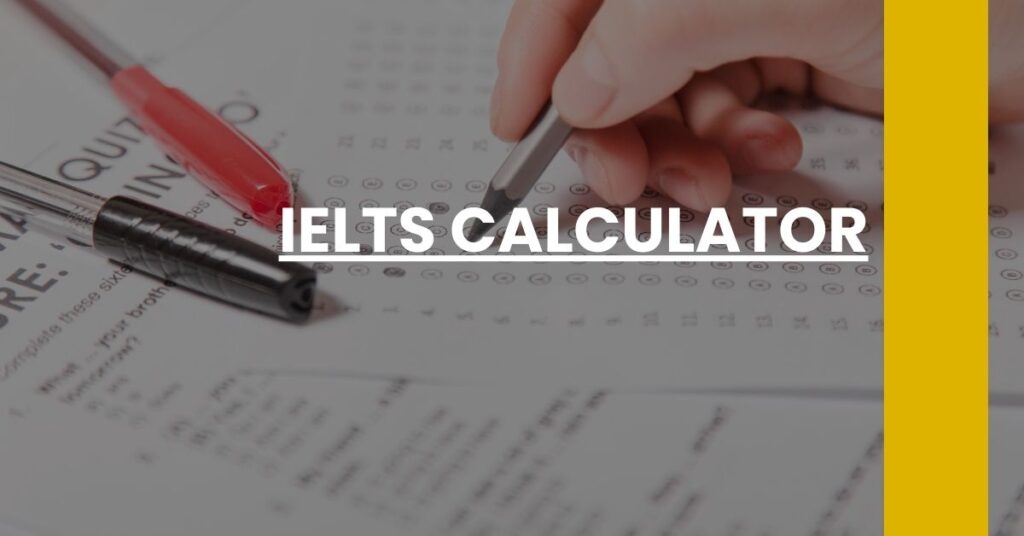An IELTS Calculator is a digital tool designed to predict your IELTS band score before taking the actual test, based on your practice test results across the Listening, Reading, Writing, and Speaking sections.
It simplifies the process of estimating your overall proficiency in English.
Here’s what you will gain insights on:
- How IELTS Calculators estimate your score
- Strategies to improve scores in each IELTS component
- The accuracy and limitations of these calculators
If you’re wondering about your potential IELTS performance, this article has the targeted answer you need.
- Understanding the IELTS Scoring System
- The Role of an IELTS Calculator
- How IELTS Calculators Estimate Your Score
- Components of the IELTS Exam and Their Weightage
- Accuracy of IELTS Calculators: Benefits and Limitations
- Using IELTS Calculators to Prepare for the Test
- Common Misconceptions About IELTS Calculators
- Free vs. Paid IELTS Calculators: What to Expect
- How to Improve Scores in Each IELTS Section
- Conclusion: Utilizing Your IELTS Calculator Effectively
Understanding the IELTS Scoring System
When you embark on the journey to take the International English Language Testing System (IELTS), knowing the ins and outs of the scoring system can add clarity and direction to your preparation. Each of the four modules—Listening, Reading, Writing, and Speaking—contributes to your final band score, which ranges from 0 to 9.
Comprehending Band Scores
Each module’s score is expressed in whole bands or half bands. To give you a concrete grasp:
- Band 9: Expert user, fully operational command of the language.
- Band 8: Very good user, with only occasional unsystematic inaccuracies.
- Band 7: Good user, with occasional inaccuracies and misunderstandings in some situations.
- Band 6: Competent user, generally effective command despite some inaccuracies.
- Band 5: Modest user, partial command of the language, coping with overall meaning.
- Band 4: Limited user, basic competence limited to familiar situations.
Your overall band score is the average of your scores in the four modules, rounded to the nearest whole or half band. This score reflects your overall English language ability. Understanding this system is pivotal as it helps in setting realistic goals and can be profoundly aided through the use of an IELTS calculator.
The Role of an IELTS Calculator
An IELTS calculator functions as a predictive tool, designed to give you a ballpark figure of what your overall band score might be based on your performance in practice tests. This can be particularly useful for managing expectations and identifying areas requiring attention.
Why It Matters
Knowing your estimated band score is more than just about numbers—it’s about understanding your capability and your readiness for the actual test. This self-awareness is crucial as you strategize your study plan. With each practice test and the corresponding estimate from the IELTS calculator, you get a clearer vision of how you are likely to fare, and where you need to invest more effort.
How IELTS Calculators Estimate Your Score
An IELTS calculator simplifies the complex data of your test scores into an understandable estimate. It applies the same averaging method used in the real test but with your practice test results. Here’s a brief breakdown of how it works:
- Feed Data: You enter your scores from each section.
- Calculate Averages: It averages these scores, considering each component equally.
- Estimate Overall Band Score: The tool rounds the average to produce an estimated band score.
This algorithmic approach mimics the official scoring mechanism, providing you with a sneak peek into your potential test results. These calculators inherently factor in the equal weightage given to all test components to offer an estimate as it would reflect on the actual test. You can find more about how these scores are derived on resources like IELTS Australia.
Components of the IELTS Exam and Their Weightage
In-depth knowledge of the structure and scoring weight of each IELTS component is fundamental to scoring high. Let’s take a closer look:
Listening and Reading
Thirty to forty questions assess various listening and reading skills bearing the same score value. One raw point is earned for each correct answer, and unlike other standardized tests, there’s no penalty for a wrong answer.
For Listening and Reading:
- Raw score out of 40: You’ll be given a raw score out of 40.
- Conversion to band score: This raw score is then converted into the IELTS 9-band scale.
The conversion charts vary slightly for the General Training and Academic modules, especially in the Reading section, as the difficulty level may differ.
Writing and Speaking
The Writing and Speaking sections are subjectively graded by certified examiners, who assess you on criteria such as task response, coherence, grammar, and pronunciation.
For Writing and Speaking:
- Descriptors for band levels: Specific performance descriptors guide the examiners for each band level.
- Subjective assessment: You’re judged based on how well you meet these descriptors.
The unbiased nature of this examination means each section, be it Speaking, Listening, Reading, or Writing, receives an equal portion of the pie when calculating the final band score.
It’s beneficial to understand that your practice reflects your potential test performance. Using an IELTS calculator for self-assessment taps into this logic, giving you a preview of your outcome based on current skills.
With a firm grasp of these components and their weightage, you can better allocate study time and practice, thereby enhancing the effectiveness of your test preparation.
Accuracy of IELTS Calculators: Benefits and Limitations
Navigating the IELTS landscape with precision is pivotal, and this is where an IELTS calculator serves as a compass. Its main allure lies in providing you with an immediate, estimated band score, which can prove invaluable in your prep strategy. However, it’s vital not to consider this estimate as an infallible prediction but rather as a guidepost.
Benefits to Take Note Of:
- Instant Feedback: You receive instant estimated scores, allowing for quick reflection and action.
- Free Accessibility: Many IELTS calculators are freely available online, making them easily accessible.
- Study Strategy: A tool like this can help pinpoint which areas may need more attention, streamlining your study plan.
Acknowledging the Limitations:
- Subjectivity Disparity: The Speaking and Writing sections, graded subjectively by human examiners, might not fully align with an IELTS calculator’s estimations.
- Test Day Variables: Numerous factors can influence your actual test performance, including test-day conditions and anxiety levels.
- Algorithmic Constraints: Calculators use algorithms that may not capture the nuanced evaluation criteria of the actual examiners.
Being mindful of these pros and cons, you are better equipped to harness the power of an IELTS calculator while maintaining realistic expectations about its outputs. Further insights on the accuracy and functionality of these calculators can be explored at IELTS Calculators’ Accuracy.
Using IELTS Calculators to Prepare for the Test
Envisioning a tactical approach to your IELTS preparation is key, and your IELTS calculator can be a stalwart ally here. As you simulate test scenarios and quantify your scores, it’s about interpreting those figures to inform your preparation tactics.
Tips to Amplify Your Prep Using an IELTS Calculator:
- Baseline Establishment: Initially gauge your proficiency level to know your starting point.
- Progress Tracking: Regularly using an IELTS calculator can help chart your progress over time.
- Focus Refinement: Decipher which specific skills need fortification and tailor your study regimen accordingly.
Accepting the results from your IELTS calculator as milestones along your prep journey, not endpoints, can transform this digital predictor into a potent prep companion. Get more insights into test preparation at IELTS Advantage.
Common Misconceptions About IELTS Calculators
In the realm of IELTS calculators, myth can sometimes overshadow reality. It’s crucial to dismantle these to optimize your use of the tool.
Unwrapping the Common Myths:
- Guarantee of Results: An IELTS calculator doesn’t guarantee the same results in the actual test.
- Exactness: While helpful, the calculated band score is an estimation, not an absolute prediction.
- Universality: Different IELTS calculators might yield slightly varying estimates.
By acknowledging these misconceptions, you can recalibrate your expectations and employ the IELTS calculator to your tangible advantage.
Free vs. Paid IELTS Calculators: What to Expect
When weighing options between free and paid IELTS calculator tools, it helps to base your choice on the depth of insight needed.
Against the Backdrop of Free and Paid Tools:
- Free IELTS Calculators: They are broadly available and can offer quick estimations, which might be all you need during early stages of preparation.
- Paid IELTS Calculators: These often come with more comprehensive features, like detailed feedback on sub-skills, which could refine your understanding of personal gaps in proficiency.
Your decision matrix here should be governed by your individual needs and the resources at your disposal. For more in-depth analysis on creating valuable content, reference resources such as Readable or HubSpot.
How to Improve Scores in Each IELTS Section
After unpacking the estimated scores from your IELTS calculator, you’re on to the next chapter: score enhancement. Every test component demands a unique set of strategies to conquer it effectively.
Listening and Reading:
- Pristine practice: Engage in focused listening and reading practices, timed to mimic test conditions.
- Diversify your sources: Source materials from different accents and topics to build robust comprehension skills.
Writing and Speaking:
- Tailored feedback: Consider employing a tutor or a tool that offers individualized feedback on your writing and speaking outputs.
- Practice coherently: Develop a narrative with clear ideas and logical sequencing in both speaking and writing practices.
Optimize your study arsenal with additional strategies aimed at raising your IELTS scores at sources like LinkedIn and IELTS Australia.
Conclusion: Utilizing Your IELTS Calculator Effectively
As we draw the curtain, it’s clear that an IELTS calculator is not a crystal ball but a valuable tool in your preparation arsenal. Whether it’s used as a thermometer to gauge your readiness or a compass to direct your study focus, its impact on your IELTS journey can be substantial.
Remember, the IELTS calculator’s backbone lies in assisting you to chart a course through the choppy waters of language testing. Use it wisely, balancing its predictive insights with the understanding that your diligence, practice, and adaptability are the true determinants of success.
Let this be the impetus that propels you forward. As you edge closer to the IELTS test day, wield your IELTS calculator with informed confidence and let your preparation, informed by its estimates, be the wind that fills your sails towards achieving your desired band score.
IELTS calculator predicts your IELTS band score, aiding your test preparation with accurate estimates for better study planning.

